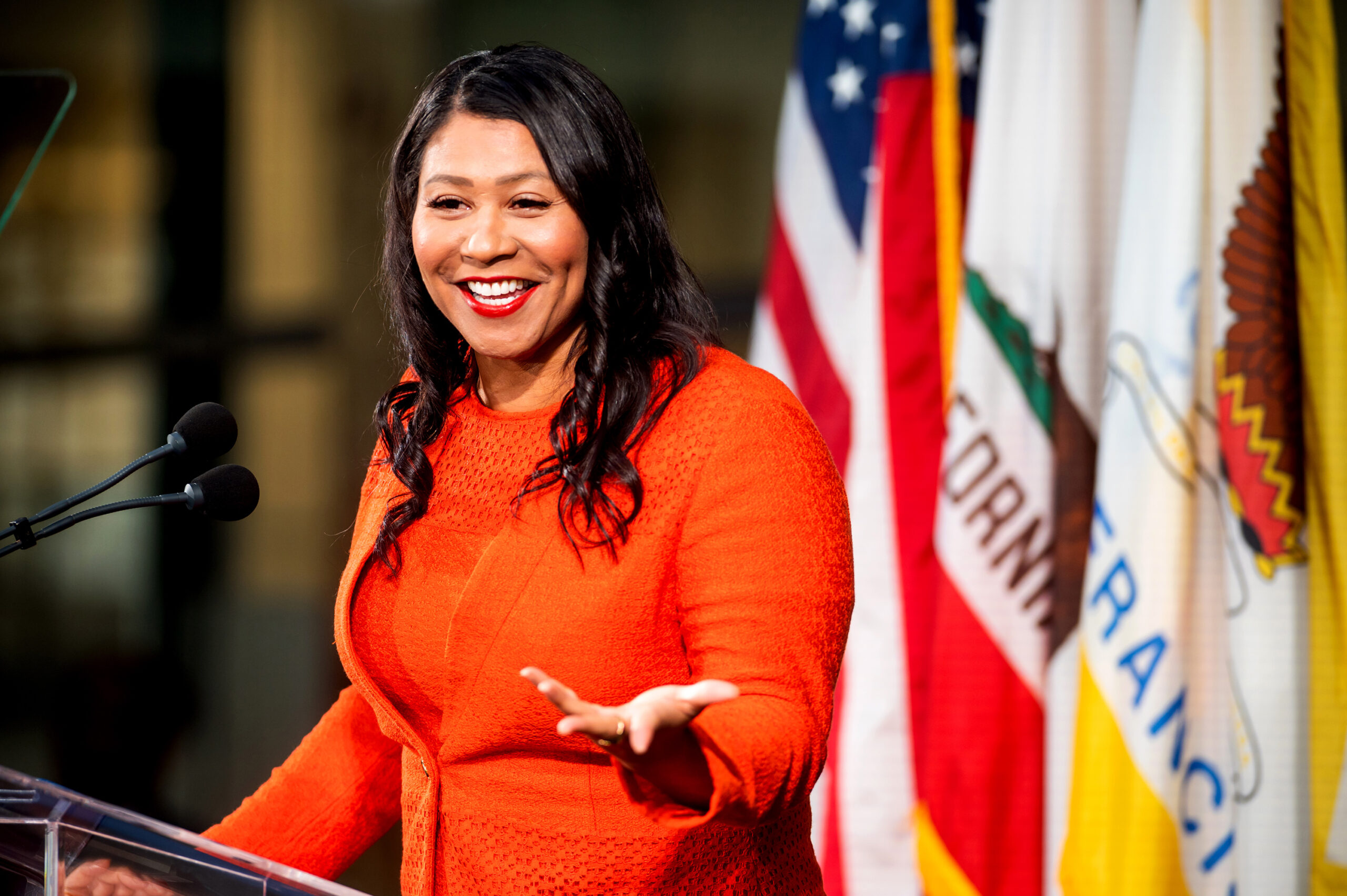In a Palace Hotel ballroom packed with hundreds of investors, engineers and business leaders, San Francisco Mayor London Breed made a confident proclamation: The city is the “the AI capital of the world,” she said.
Breed closed out the one-day AI Forward conference, touting the city’s roster of deep-pocketed investors and local universities that make it fertile ground for artificial intelligence. Organized by Goldman Sachs and SV Angel, the conference featured Microsoft co-founder Bill Gates and OpenAI President Greg Brockman, among others.
In her remarks, Breed pitched the city as the epicenter of cutting-edge tech along with some big ideas, such as a partial redevelopment of the Westfield San Francisco Centre, the Downtown mall Nordstrom recently announced its departure from, or putting a soccer field and open space right in the middle of the Moscone Center.
“Our goal is to make it as easy as possible for you to focus on creating this incredible, innovative thing that’s going on that everybody is talking about,” Breed told the crowd.
“We have to start thinking bigger than just within our confined spaces of what’s possible,” Breed said in an interview after the event. She added that she hopes to identify more formal ways for the city to work with AI companies and use their technology.
“We have to make it easier to collaborate, to change our policies, easier to welcome new technology and new things that are going to help us run the city even better than we’ve ever run it before,” Breed said.
From a policy perspective, Breed said she supported “appropriate regulation” regarding AI and said that the city should try and focus on thinking through how to help people transition if new technologies threaten their jobs.
But in an onstage interview with SV Angel Managing Partner Ron Conway, OpenAI’s Brockman told an anecdote that underscored the challenges that may lie ahead for AI companies located in San Francisco.
Brockman said he recently tried to recruit a candidate for a position at OpenAI. According to Brockman, the candidate replied, “Look, I really want to join. I don’t like the Mission.”
At first, Brockman was defensive about the company’s ambition to ensure the technology “benefits all of humanity.” But then he realized the person was talking not about the company’s mission, but rather about the neighborhood where OpenAI’s headquarters are located.
“Look, I think that SF is by far the best place to start an AI company. But it could be better,” Brockman said. “I think there’s a lot of reasons that San Francisco is succeeding despite, rather than because of, its policies.”
That hasn’t yet stymied the growth of some companies in the market. According to real estate sources, OpenAI is one tenant looking for additional space right now alongside other AI startups like Adapt-AI and Humane AI.
Brockman said the city actively choosing to be “pro-business” would send a positive signal to tech firms.
“People talk a lot about cleaning up the streets. But there’s a question of, ‘What’s the goal? What’s the objective?’” Brockman said. “I think it’s possible that it’s going to be the best place imaginable in the world for AI.”
In an interview, Conway said the local AI boom has already been drawing people back to San Francisco. But it’s up to city officials to do the work to keep the momentum going, he said.
“If we can create more jobs and prosperity in San Francisco, then that’s the recipe,” Conway said. “San Francisco already has the culture, the neighborhoods, the environment. We have the bones.”
He said that he’s had conversations with multiple tech leaders who are returning to the city after pandemic-era sojourns to cities like Miami and Austin.
Although Conway said that the city has been subject to a string of “high-profile, negative incidents,” he noted that the violent crime rate remains low when compared with other similar cities. Petty crime, on the other hand, is a problem that city officials must tackle, according to Conway.
Conway specifically highlighted the YIMBY movement as a pathway to keeping residents in the city through the development of affordable housing. He was a major donor to November 2022’s failed ballot measure Prop. D, which aimed to implement more streamlined approval processes for certain types of housing.
Conway said California YIMBY has a slate of new housing bills that the organization is planning on trying to introduce during the next state legislative session. Ultimately, Conway said he believes it’s the tech sector’s role to create both new white-collar and blue-collar jobs pegged on new innovations.
“That’s how we filled all these office buildings and how we’re going to fill them all again,” Conway said. “We thought Web 2.0 and the internet was a big deal? This is going to be bigger.”
Conway agreed with the sentiment among some tech leaders who have positioned 2024 as a milestone year in the city’s political history.
“Voters are the most aware and woken up than they’ve ever been, which is really good for the city,” Conway said.
